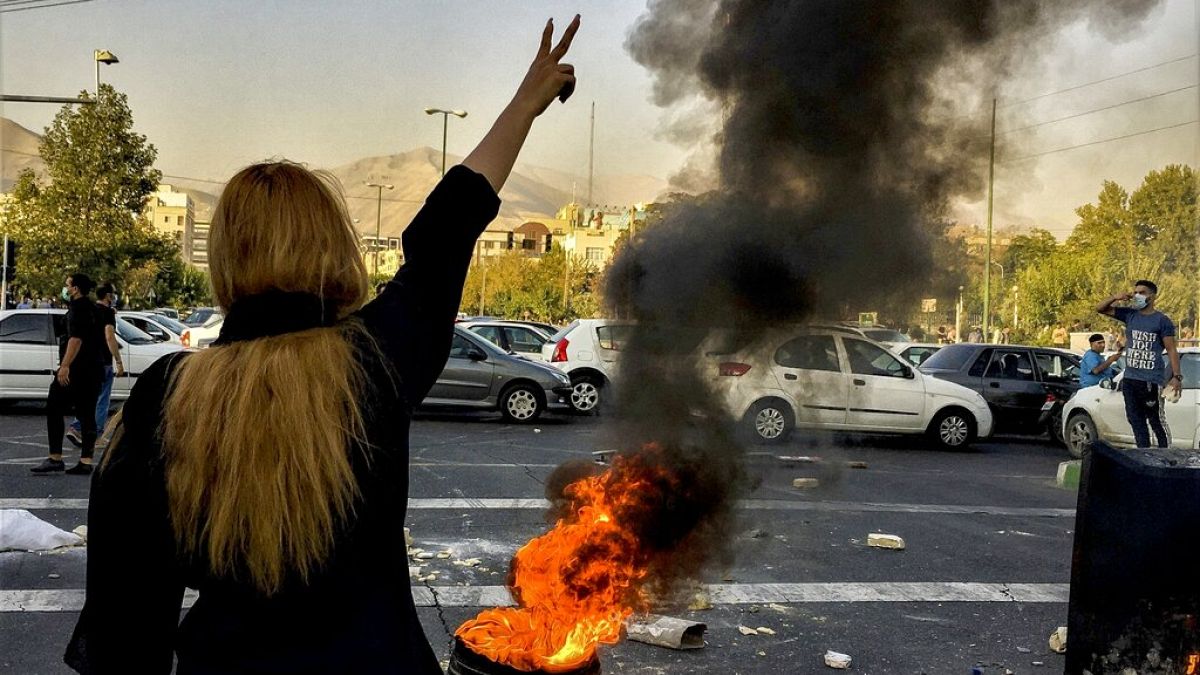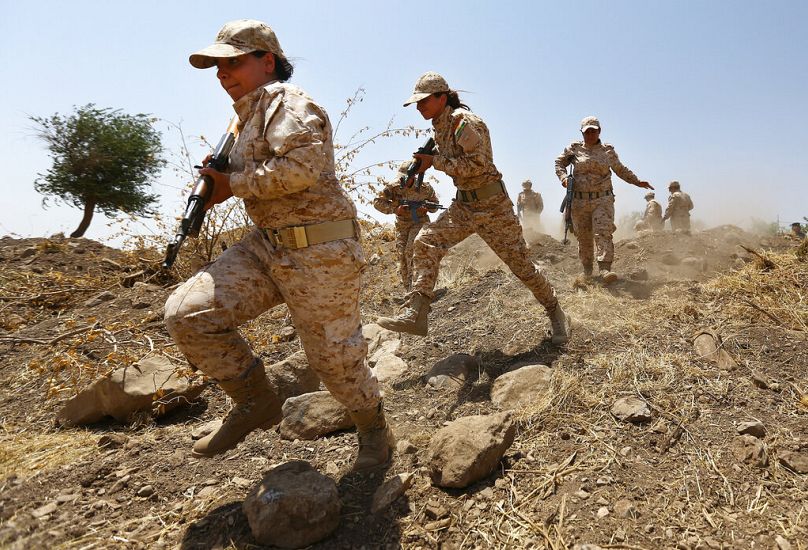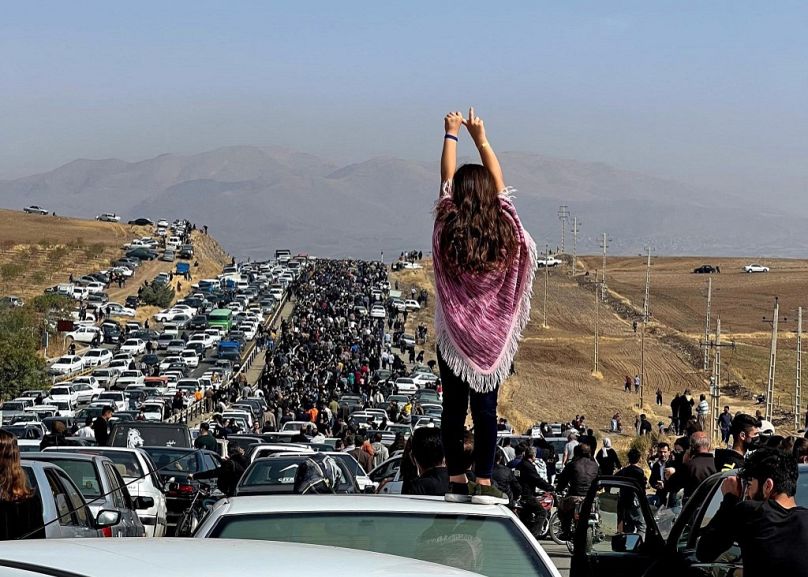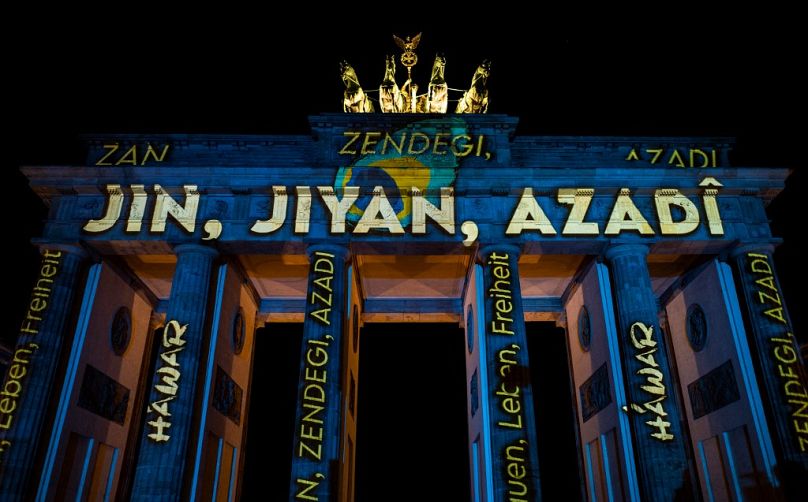From revolutionary Kurdish political writings to the women fighting against ISIS in northern Syria, the phrase 'woman, life, freedom' has an interesting back story.
Words have power.
They shape our beliefs, drive our behaviour and ultimately create our world.
In Iran, three simple words have become immensely important in recent months: ‘Woman, life, freedom’.
Ringing out across the country and among the Iranian diaspora, they are the rallying cry of anti-government protests that broke out in September, after the death of Mahsa (Jina) Amini, a young Kurdish woman.
But what are the origins of the phrase ‘woman, life, freedom’? How did it spread to Iran? And why it is so important to protesters?
‘From Turkey, to Syria, to Iran'
The phrase has a long history among Kurds in the Middle East.
It can be traced back to women in the Kurdish National Liberation Movement in Turkey and the writings of Abdullah Öcalan, the founder of the PKK (Kurdistan Workers’ Party).
The Kurds are a 30 million-strong ethnic group, scattered across Turkey, Iraq, Syria and Iran, who share a similar culture and language. They are one of the world’s largest stateless peoples and have fought a centuries-long struggle for greater recognition and independence, particularly in Turkey.
“[Women, life, freedom] is reflected a lot in the political philosophy of Öcalan,” Meghan Bodette, Director of Research at the Kurdish Peace Organisation, told Euronews.
“He famously wrote that to free society from economic exploitation [or] the Kurdish people from national oppression… the first form of oppression that must be tackled is the oppression of women, since it leads to all other hierarchies."
“The idea that women's freedom is essential for the freedom of all of society - that’s what’s encapsulated in the slogan,” she added.
The phrase remained significant for the Kurdish movement in Turkey, being used at demonstrations and meetings of Kurdish women as early as 2003. However, it did not become widespread until the Syrian Civil War erupted in 2011.
As Syria disintegrated into its various regional and ethnic enclaves, Kurdish women in the YPJ, an all-female militia, put the phrase into practice fighting the Islamic State and helping establish an autonomous state in northern Syria, which passed progressive laws on the rights and status of women.
“This struggle captured the imagination of Kurds across the Middle East, especially the women in Iranian Kurdistan,” said Dr Marouf Cabi, a Visiting Fellow at the London School of Economics’s Middle East Centre.
“People followed the news, they paid attention, they identified themselves with the fight against ISIS and what was going on in Rojava,” he told Euronews. “This is when the phrase first entered people's consciousness.”
How did the phrase women, life, freedom spread to Iran?
Fast forward to 17 September 2022.
During the funeral of Mahsa (Jina) Aminil, who died after being arrested by Iran’s morality police, Kurdish women removed the headscarves they must wear by law, and began chanting “women, life, freedom”.
“Kurdish women protesting this murder would have likely seen what happened [to Amini] as an example of the patriarchal and state violence they as Kurds -- and as women -- face every day," said Bodette.
Amini’s family and activists say she was killed by officers, who violently struck her head several times, though Iranian authorities claim the 22-year-old died of a heart attack.
She was arrested for allegedly not wearing her headscarf properly and sporting skinny jeans.
‘Women, life, freedom’ quickly spread across Iran as protests over Amini’s death engulfed the country.
According to Bodette, the three-worded phrase became so popular because it resonates with exactly what people in Iran are struggling for. “It represents everything the Iranian state is against,” she said.
Movements for gender equality and the rights of women and ethnic minorities in Iran began almost immediately after the 1979 Islamic Revolution.
Despite promising that it would not happen, the new government soon set about enforcing strict Islamic laws and dress codes on the population, making it compulsory for women to wear a headscarf in 1983.
Meanwhile, attempts by the country's Kurdish population to forge their own independence were brutally suppressed in the years following the revolution, leading to at least 10,000 dead and 200,000 people displaced.
“These words ['women, life, freedom'] sum up a struggle against all kinds of religious extremists and authoritarian states both in Iran and the wider region”, said Bodette.
‘Its become a catchy phrase’
But there are some concerns about how the phrase is being used, which highlight historic issues impacting Kurdish populations in Iran and the Middle East.
“There's been criticism from many Kurds, particularly many Kurdish women, that the slogan has sometimes been separated from its Kurdish roots,” says Bodette, especially when it is used by the international media, celebrities, brands and politicians.
For example, the words are occasionally only written in Persian or English, not Kurdish.
While she said many Kurds are happy to see protesters adopting the phrase -- viewing it positively that others are embracing their ideas -- Bodette claims this separation can “erase” the “radical history of resisting oppression” by Kurds everywhere that lies behind it.
“This history is really important to show the true power of these words, that women-led movements can unite society against oppressive governments, religious fundamentalism and ultra-nationalism,” she told Euronews.
"Kurdish women believe that their movement is a universal movement for the freedom of women everywhere."
"Even if the Iranian government doesn't fall tomorrow, the protests have already proven that the idea of 'women, life, freedom' is a very powerful one."
"It's not going to go away anytime soon," Bodette added.



